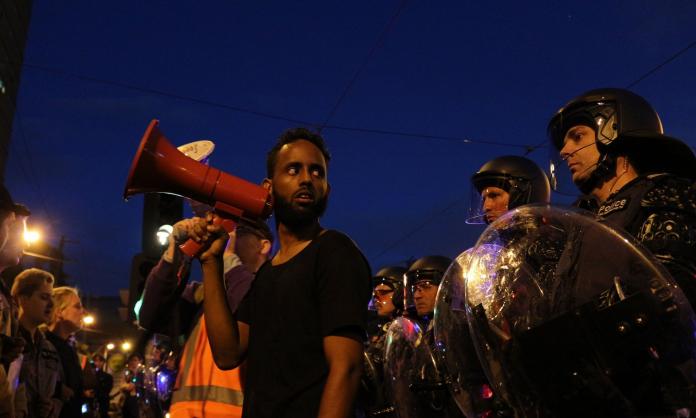Make no mistake: the 3,000 public housing tenants in Melbourne who are now under house arrest are paying the price for the state Labor government’s handling of the COVID-19 pandemic. Premier Daniel Andrews buckled under pressure from the political right to reopen the state before it was safe to do so. Worse, instead of employing health professionals to oversee and administer quarantining of returned travellers – including many who were active COVID-19 cases – they offloaded this responsibility to private security firms.
Reports are now emerging that security guards working at quarantine sites complained to the state health department over lack of training and protective equipment, while those quarantined were not isolated and were allowed to use communal spaces, thus spreading the virus among non-infected travellers and staff. One guard told the Today show that he received only five minutes of training before beginning his work at a quarantine hotel.
On Saturday afternoon, without even the 24-hour notice afforded to residents in other locked down suburbs around Melbourne, residents from nine public housing towers in Melbourne’s inner north-west were told they would not be allowed to leave their flats for at least five days. Some tenants found out via short, uninformative text messages. Some found out via media reports. Others found out when they returned home to find hundreds of police deployed at the entrances of their estates.
The deployment of a permanent 500-strong police presence at the estates in Flemington and Kensington is deeply troubling. Victoria Police has a long-documented track record of racial profiling and racist policing practices within that community in particular.
The Police Accountability Project, run out of Flemington & Kensington Community Legal Centre, has found that young Africans living in the area have been 2.5 times more likely to be stopped by police than any other group. Many young Africans, including six who were part of a federal court case against Victoria Police over racial profiling, report being subjected to random stops and searches. Their belongings, like mobile phones and CD players, were confiscated if they didn’t have receipts proving they owned them.
I’ve seen first-hand the brutal treatment of the area’s migrant community by Victoria Police. In December 2017, I helped organise a protest against local neo-Nazi and white nationalist crowds who had descended on Flemington to hear far-right provocateur Milo Yiannopoulos speak at a venue just across the road from the biggest public housing estate.
I was deeply moved when public housing tenants and sympathetic locals joined our protest against the far-right rally taking place on their doorsteps. They chanted side by side with us and confronted the right wing immigrant-haters who’d come to Flemington to hear Yiannopoulos speak.
But Victoria Police had a different response. As night fell, riot police began terrorising the residents and anti-racist activists with batons, shields and capsicum spray. They chased the residents into their homes and into the night. That night. when fascists visited Flemington, Victoria Police joined the fascists in intimidating local residents, mostly of Muslim religion and African background.
We know that migrants, refugees, the elderly and disabled disproportionately make up the resident populations of the flats in Flemington, Kensington and North Melbourne. During this “hard lockdown”, some pleaded with police stationed on every floor to be allowed to get basic essentials like bread, milk, baby formula or medication: they were told they would not be allowed out for any reason.
We know from residents themselves that since the beginning of the pandemic, scant information or support was given to those living in public housing. Health advice often went untranslated into community languages. Community leaders were rarely consulted on how to approach locking down such densely packed accommodation. At one tower, a single bottle of sanitiser was placed on the building’s ground floor. When it was used up seven days later, the bottle was simply left empty, not replaced.
Awatif Taha, a public housing resident, wrote in the Guardian: “[Suddenly] we are locked down but they should have been aware when the virus was coming that this is a crowded area and needed more attention. So we have been scared, and we have thought that the government had forgotten us. We have had no way of being heard”.
Yet now that a coronavirus outbreak threatens to rip through accommodation where some of the city’s poorest and most vulnerable residents live, Daniel Andrews – true to form – sent in 500 police officers to turn these people’s homes into prisons. The residents of these towers have already had more than enough intimidation from Victoria Police. Instead of sending cops to lay siege to their homes, Andrews could have announced that the towers were being flooded with translators, health care professionals and cleaning teams.
We can only assume that, over the coming period, the virus will continue to revive, causing more local outbreaks. Social distancing measures and lockdowns have proven effective in countering the virus’s spread, and they should be a part of any public health response. But the virus doesn’t affect all of society equally.
It’s no coincidence that public housing tenants face grave risk: these are teachers’ aides, security guards, community and health workers, hospitality workers, Uber and food delivery drivers. While many white collar workers have had the option of staying at home, many tenants in Flemington, Kensington and North Melbourne haven’t been afforded that right. Instead, they have had to continue to interact with the public in the midst of a deadly pandemic and return home to overcrowded public housing, where run-down facilities and lack of resources make social distancing difficult, if not impossible in some cases.
This “hard lockdown” in Melbourne’s public housing isn’t the natural, inevitable result of a recent spike in cases. It is the product of systematic neglect by successive state governments, infected by a neoliberal logic that would sooner pour billions into police and prisons over building new public housing stock or improving the homes that exist.








